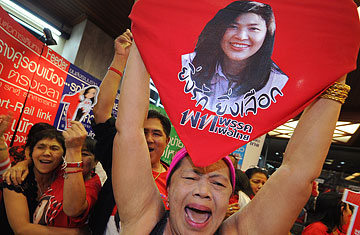
Supporters of Yingluck Shinawatra cheer after the Election Commission approved her election
Yingluck Shinawatra passed another important hurdle on her path to becoming Thailand's first woman Prime Minister this week. On Monday, the country's Election Commission dismissed complaints against her and approved her victory in the July 3 polls, allaying fears among supporters that her opponents would engineer her disqualification and concerns among analysts that political turmoil would erupt once again if her path to the premiership was blocked. Nonetheless, more legal challenges may be awaiting the Prime-Minister-to-be even after parliament reconvenes and formally elects her to Thailand's top political job next month.
Yingluck and her Pheu Thai Party won an absolute majority in parliamentary elections earlier this month and have since formed a six-party coalition due to begin governing in August. Numerous complaints of electoral violations were filed against Yingluck during her campaign, however, and the Election Commission kept the country in suspense for more than two weeks while it investigated the charges, which included alleged vote buying because she handed out noodles she had cooked at a rally. "I believe the Election Commission will give me justice," Yingluck said just hours before the commission rendered its decision.
A previous Prime Minister, Samak Sundaravej, had to step down from office in 2008 after a court ruled that his hosting a cooking show on television while also serving as Prime Minister violated a constitutional provision that PMs have no other source of income. Samak was an ally of Yingluck's older brother Thaksin Shinawatra who was ousted as Prime Minister in 2006 by a military coup and who lives in self-imposed exile rather than serve a two-year prison sentence on a corruption conviction. Thaksin's supporters believe his opponents in the military and the conservative establishment have been able to influence the courts and the bureaucracy to prevent his political allies from holding on to power and eventually facilitating his return to Thailand.
The courts have yet to have their say on Yingluck. At least two cases have been filed against her that could possibly result in her disqualification to hold office. The first was lodged by a member of the Democrat Party of outgoing Prime Minister Abhisit Vejjajiva, whose own election as a member of parliament was also endorsed on Monday by the Election Commission. The case alleges that Pheu Thai is in violation of the law because the party is in reality headed by Thaksin, who was also banned from politics by a court in 2007 when his former party was found guilty of electoral fraud and dissolved. Pheu Thai's campaign slogan in the recent election was "Thaksin thinks, Pheu Thai acts." The complaint calls for the dissolution of the Pheu Thai party and the automatic banning of its executives from politics. But outgoing government spokesman Panitan Wattanayagorn conceded last week that the case is unlikely to be successful, as the Democrats also have spent the last two-and-a-half years in a coalition government with two parties also headed by banned politicians.
The second case involves allegations that Yingluck committed perjury three years ago before a government-appointed committee that was investigating whether her brother was concealing his assets. The case, filed by an anti-Thaksin citizens' group and a former member of that committee, claims she lied by saying wealth that actually belonged to Thaksin was hers. Thailand's constitution places limits on the amount and types of assets politicians can hold in order to prevent conflicts of interest.
While the Election Commission's approval of Yingluck's win this week has soothed concerns of renewed political conflict, it has yet to approve the victories of 10 candidates associated with the violent political conflict of 2010. The 10 Pheu Thai members of parliament are leaders of the pro-Thaksin Red Shirts who led street protests in Bangkok. The Red Shirts had an armed wing under the command of a rogue army general. Their dispersal by government troops after a two-month protest in central Bangkok resulted in over 90 deaths, most of them civilian. Should the Election Commission approve their victories, the new MPs would enjoy parliamentary immunity from a slew of charges — including terrorism — that have been filed against them for their alleged roles in the violence.
